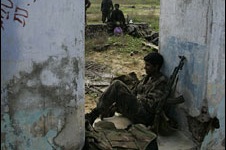 The Indian government has sought assurances from Colombo that civilians trapped by the fighting in Sri Lanka will be protected.
The Indian government has sought assurances from Colombo that civilians trapped by the fighting in Sri Lanka will be protected.
India’s appeal came as the Sri Lankan army pushed forward in its offensive against Tamil Tiger rebels in the north of the country.
The Indian embassy said the Sri Lankan government had insisted that safe zones for Tamil civilians would be respected.
The Red Cross has warned the battle is causing a humanitarian crisis.
It said hundreds of civilians had been killed and a quarter of a million people were trapped by the fighting.
India’s external affairs minister, Pranab Mukherjee, held talks with Sri Lankan President Mahinda Rajapakse during an unscheduled visit to the country.
"The Sri Lankan government has reassured that they would respect the safe zones and minimise the effects of conflict on Tamil civilians," the Indian High Commission in Colombo said in a statement after the talks.
Threat
Sri Lanka’s minority Tamil community in the island’s war-ravaged north-east has close cultural, religious and business ties with the over 50 million Tamils living in the southern Indian state of Tamil Nadu.
There have been reports in the Indian media that a regional Tamil party, which heads the government of Tamil Nadu and is an ally of the ruling Congress-party-led federal coalition, has threatened to pull out if the security of Tamils in Sri Lanka was not ensured.
Pranab Mukherjee said the Indian government wanted to work with its Sri Lankan counterpart to ensure the restoration of normalcy in the northern part of the island.
"I stressed that military victories offer a political opportunity to restore life to normalcy in the northern province and throughout Sri Lanka," he was quoted by the high commission as saying.
"We will work together with the government of Sri Lanka to enable all Sri Lankans, and particularly the Tamil community who have borne the brunt of the effects of the conflict, to lead normal lives as soon as possible."
Separately, the International Committee of the Red Cross (ICRC) has called on the government troops and rebels to allow immediate and free access to the combat zone for humanitarian workers.
It said the civilian population was paying the price for the conflict.
The ICRC based its figure of hundreds dead on body counts by its staff in local hospitals.
Access for aid workers was so limited, it said, that the ICRC’s own presence in the region was virtually meaningless.
The ICRC wanted to evacuate 200 critically wounded people on Tuesday but did not receive security clearance.
Those patients, it says, now face death.
The UN secretary general and the European Union have also expressed deep concern for civilians caught in the fighting.
The military say they are involved in a final push against retreating rebels.
Moving north from the captured rebel town of Mullaitivu, they are trying to secure the north-east coastline to encircle the rebels and say they hope to control the entire north within weeks.
The Tamil Tiger rebels could not be reached immediately for comment.
Access to the combat zone is tightly controlled, making it difficult to verify the actual situation.
Ghost town
The military did take a group of journalists, including the BBC’s Chris Morris, to the region on Tuesday.
Brig Nandana Udawatte, who led the capture of Mullaitivu, said that "mortar fire, indirect fire and close-quarter battles" were going on 1.5 km from the town of Puthukkudiyiruppu.
Pro-rebel sources have previously accused the army of killing hundreds of civilians with shellfire – allegations the military denies.
(For updates you can share with your friends, follow TNN on Facebook and Twitter )
